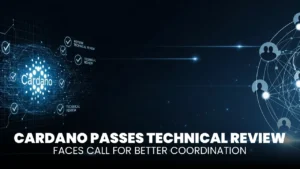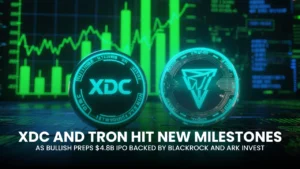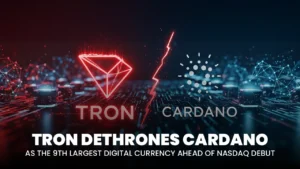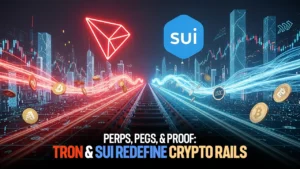ARK Invest Rolls Out Space-Defense ETF in Europe as XDC Network Makes Headway in Dubai

Two stories at the edge of finance and infrastructure advanced today, and together they tell a single, investable narrative. In Europe, ARK Invest received approval to launch an active UCITS fund focused on space-and-defense innovation, signaling a higher-conviction approach to a sector where European issuance has accelerated this year.
- ARK Invest Goes Europe-First with Space-Defense UCITS
- Dubai Signals Bank-Grade Blockchain Rails on XDC
- Why the Two Threads Belong in One Story
- What It All Means for Crypto Markets and Investors
- Today’s Developments at a Glance
- Conclusion
- Frequently Asked Questions About ARK Invest’s ETF, Dubai’s XDC Network Payments Push
- How Is ARK Invest’s Europe Fund Different From U.S. Options?
- Why Does Delegated Proof of Stake Matter to Banks?
- What Is the Significance of ISO 20022 Alignment?
- Will European Defense ETFs Crowd Into the Same Names?
- How Does Dubai’s Policy Environment Influence Adoption?
- Where Do Space, Defense, and Payments Intersect?
- Glossary of Key Terms
While in Dubai, the XDC Network’s payments initiative used GITEX week to court banks and fintechs with compliance-ready, ISO 20022-aligned rails, aiming to plug blockchain into day-to-day clearing without breaking the rules. Put simply, one story tilts equity capital toward strategic hardware and orbital data, the other pushes transaction plumbing toward programmable money. Both are about pipes, reach, and resilience.
ARK Invest’s Europe-first product arrives as European defense ETFs attract fresh assets and new entrants, including WisdomTree and HANetf, underscoring persistent demand for security-linked exposure in a region that has prioritized industrial capacity and supply resilience. The Dubai development runs on XDC Network’s enterprise chain, which uses a Delegated Proof of Stake (DPoS) design to maintain finality and throughput with institution-friendly governance, positioning it as a candidate for bank-grade pilots that speak SWIFT’s language.
ALSO READ: Is Cardano Back on Track: How Hydra and Exchange Staking Revived a 10% ADA Rally
The connective tissue is investors’ need for real cash flows, durable moats, and regulatory clarity. A space-and-defense portfolio leans into procurement-driven revenue and dual-use technology. An ISO-native payments stack leans into compliance data, message standards, and lower-friction settlement. If 2020s investing is about owning the rails, these are the rails.
ARK Invest Goes Europe-First with Space-Defense UCITS
ARK Invest will end an 18-month European launch pause with a new active UCITS ETF targeting space-and-defense innovation, approved by Ireland’s regulator and positioned as its maiden Europe-first strategy.
The product complements ARK Invest’s UCITS lineup that followed its acquisition of Rize ETF, and it lands in a region where thematic flows have pivoted toward defense and dual-use technology since 2023. The timing reflects two realities.
First, European policymakers and asset managers have seeded a pipeline of defense-focused vehicles, including WisdomTree’s Europe-only defense ETF and HANetf’s regional variant, validating demand for diversified exposure beyond U.S. primes.
Second, investor appetite has broadened to space-adjacent enablers such as launch, communications, Earth observation, and cyber, which tie directly to defense procurement and critical infrastructure.
A Europe-first structure matters for several reasons. UCITS rules can expand distribution across EEA markets, and a Dublin domicile aligns with established European fund plumbing. Active management gives ARK Invest room to balance upstream manufacturers, downstream software, and sensors-to-data plays, which have moved in different cycles during the last two years. The approach also aligns with ARK Invest’s U.S. ARKX product, but the UCITS scope can tilt toward European supply chains that have gained policy support and budget visibility.
ALSO READ: Cardano Releases Hydra Node 1.0; Aims for Faster Transactions, Higher Throughput
The backdrop is constructive. European defense issuance has risen, and flows into defense-linked UCITS funds hit records in H1 2025, according to industry trackers. While investors should discount political risk and procurement timetables, the allocation case is straightforward.
Recurring service revenue in cyber and space communications, plus multi-year order books in munitions and platforms, can provide ballast within a growth-tilted portfolio. The launch, therefore, reads as both an expansion of ARK Invest’s European footprint and a bet that defense-heavy thematics have staying power.
Dubai Signals Bank-Grade Blockchain Rails on XDC
Our mandate is to build the world’s most advanced financial center in Dubai, stimulate the local venture ecosystem, and support the next generation of high-growth technology and innovation companies.” — Arif Amiri, CEO, DIFC Authority, in a statement announcing a new growth-debt partnership that underscores Dubai’s market-building posture.
Across the Gulf, XDC Network used GITEX week to convene banks, fintechs, and enterprises around an ISO 20022-aligned payments stack that aims to plug into existing bank workflows. The session, held at DIFC during the city’s flagship tech event, focused on compliance, SWIFT connectivity, and the practicalities of onboarding institutions to permissioned-access public rails.
The message was pragmatic. Align with messaging standards, respect KYC and AML gates, and integrate where banks already live instead of forcing a leap to parallel systems.
The design matters. XDC Network is an enterprise chain with EVM compatibility and a Delegated Proof of Stake consensus that emphasizes throughput and finality while enabling permissioned controls at the edge.
That architecture can limit operational overhead for banks that need clear validators, uptime targets, and governance paths, especially when handling tokenized receivables or trade instruments. Dubai’s policy context is supportive. The UAE’s central bank has published a Digital Dirham framework and continues to build out the Financial Infrastructure Transformation program, while DIFC positions itself as a regional launchpad for bank-fintech partnerships.
Crucially, the pitch here is not hype. It is data in, data out. ISO 20022 fields carry richer payment metadata, reducing reconciliation friction, improving screening, and making bank compliance teams more comfortable with on-chain proofs. The closer blockchain messages look to existing payment messages, the lower the switching cost. If pilots convert, banks gain speed and transparency without rewriting the whole stack, and treasurers gain better straight-through processing.
We are excited to join #GITEX Week alongside #XDCNetwork at the #XDCInnovationLab in #Dubai, bringing together the brightest minds in Payments, AI, Blockchain, DeFi and RWA!
Check out these transformative side events this week:
-Powering the Future of Finance: XDC Payments…
— Plugin (PLI), XDC’s Decentralized Oracle (@GoPlugin) October 11, 2025
Why the Two Threads Belong in One Story
Equities and rails rarely move in lockstep, but they do rhyme when states prioritize resilience. Europe’s defense build-up is both a security and an industrial policy. It lifts order visibility for suppliers, contract research firms, and satellite operators. At the same time, Dubai’s payments push is a financial-infrastructure policy. It improves data quality and risk controls, and it primes the economy for programmable assets and faster settlement.
🌐 Join Us at GITEX Week!
Powering the Future of Finance: XDC PaymentsDiscover how XDC Payments is revolutionizing cross-border transactions and digital payments.
Be part of the conversation shaping the next generation of financial innovation!
📅 Date: October 13, 2025
🕒 Time:… pic.twitter.com/pOQggrs3c7— XDC Innovation Lab (@XDCInnovLabs) October 8, 2025
For investors, these are not speculative fringe moves. They are convergence stories where public budgets, standards bodies, and regulated entities set the cadence. A Europe-domiciled space-defense ETF offers a UCITS-conformant wrapper for targeted exposure in a region with political buy-in. An ISO-forward, Delegated Proof of Stake blockchain in a top-tier financial center offers a testing ground for tokenized money flows that compliance desks can accept. Both themes reduce one key risk: implementation uncertainty. When standards and policy align, timelines shorten.
What It All Means for Crypto Markets and Investors
The immediate takeaway is portfolio construction. Investors looking for defense-linked earnings with policy tailwinds will soon have a new active UCITS option from a high-profile manager, complementing existing passive choices.
The allocation question is how to size space-and-defense within a broader equity sleeve without over-concentrating cyclical exposure to procurement cycles and geopolitics. Active discretion may help rotate between munitions upcycles and communications software as contracts land.
On the rails side, investors and corporate treasurers should track whether Dubai’s pilots harden into production. If ISO-native, Delegated Proof of Stake (DPoS) networks like XDC Network secure bank integrations, payment data quality, and reconciliation speed could improve, lifting working-capital efficiency for exporters and logistics firms.
That improvement shows up not only in blockchain-linked tokens but also in cash flow statements. The compliance-first narrative also reduces headline risk. Using ISO fields and SWIFT-compatible flows addresses a recurrent boardroom question: how do we adopt programmable settlement without breaking auditability?
Finally, there is a macro linkage. Defense and payments modernization both depend on sovereign capacity and standards alignment. As Europe leans into defense industrial policy and the UAE formalizes CBDC planning and fintech programs, investors get clearer roadmaps. Clarity is a discount rate story. Less uncertainty about the path means a better chance that projected cash flows survive model sensitivity.
ALSO READ: Ark Invest’s $10M Push Into Securitize Signals Wall Street’s Big Shift to Tokenization
Today’s Developments at a Glance
| Theme | Development | Why It Matters | Key Sources |
| Europe ETFs | ARK Invest receives approval for an active UCITS space-defense ETF | Expands investor access to defense-linked earnings via a Europe-first, active vehicle | ETF Stream |
| Peer Landscape | WisdomTree and HANetf roll out Europe defense products | Validates regional demand, diversifies beyond U.S. primes | FT WDEF, FT HANetf |
| Dubai Payments | XDC hosts a bank-focused payments session during GITEX | Positions ISO-aligned, DPoS-based rails for compliant bank use | CoinChapter |
| Policy Backdrop | UAE Digital Dirham policy paper, DIFC fintech initiatives | Provides standards and programs that de-risk pilots | CBUAE, DIFC Release |
Conclusion
Europe’s defense allocation story and Dubai’s payments modernization push are not separate tech headlines. They are complementary signals that capital and policy are rewiring critical infrastructure.
ARK Invest’s Europe-first, active space-and-defense UCITS ETF adds a targeted vehicle for investors who want exposure to strategic hardware, orbital data, and cyber capability, all with regional policy support. Dubai’s XDC Network payments initiative advances the compliance-first case for blockchain rails that speak ISO 20022 out of the box, backed by a Delegated Proof of Stake (DPoS) architecture that aligns with bank operational needs.
For investors, both threads offer a way to own the rails, rather than the traffic. The common denominator is standards. When messaging formats, fund rules, and consensus designs match what regulators and treasurers already trust, adoption curves steepen, risk premia compress, and cash flows gain durability.
Frequently Asked Questions About ARK Invest’s ETF, Dubai’s XDC Network Payments Push
How Is ARK Invest’s Europe Fund Different From U.S. Options?
It will be an active UCITS ETF domiciled in Ireland, enabling cross-border European distribution and portfolio discretion focused on space-and-defense names. It complements but is distinct from U.S. structures.
Why Does Delegated Proof of Stake Matter to Banks?
DPoS can balance validator accountability, finality, and throughput, which banks need for predictable settlement and clear governance. XDC Network’s DPoS flavor targets enterprise use with compliance-friendly controls.
What Is the Significance of ISO 20022 Alignment?
ISO 20022 adds structured data fields for richer payment information, improving screening, reconciliation, and auditability. Banks already use it across cross-border corridors.
Will European Defense ETFs Crowd Into the Same Names?
Concentration risk exists, but fund design varies by index and active remit. Europe-only screens have emerged, and active managers can tilt toward communications and cyber to diversify.
How Does Dubai’s Policy Environment Influence Adoption?
A clear CBDC roadmap and DIFC programs lower implementation risk for pilots, and they attract vendors who can meet bank standards.
Where Do Space, Defense, and Payments Intersect?
In dual-use connectivity and secure communications. Satellite links, cyber, and secure messaging standards underpin both battlefield and bank-desk reliability. That overlap strengthens the case for owning the rails across domains.
Glossary of Key Terms
- UCITS: European fund regime that enables cross-border distribution with standardized investor protections.
- DPoS: Delegated Proof of Stake, a consensus design where token holders elect validators to secure the network with high throughput and governance clarity.
- ISO 20022: Global messaging standard that adds structured data to payment instructions, improving screening and reconciliation.
- CBDC: Central bank digital currency used for wholesale or retail settlement under a central bank’s mandate.
- Earth Observation: Satellite-based imaging used for defense, agriculture, energy, and disaster response.
- Dual-Use Technology: Tools with civilian and military applications, such as cybersecurity or satellite communications.
- Finality: The point at which a transaction cannot be reversed, crucial for financial settlement.
- Throughput: Number of transactions a network can process per second, relevant to payment rails.
- SWIFT: The global interbank messaging network for cross-border payments and financial communication.
- Active ETF: A fund where managers make security-selection decisions rather than tracking a fixed index.




